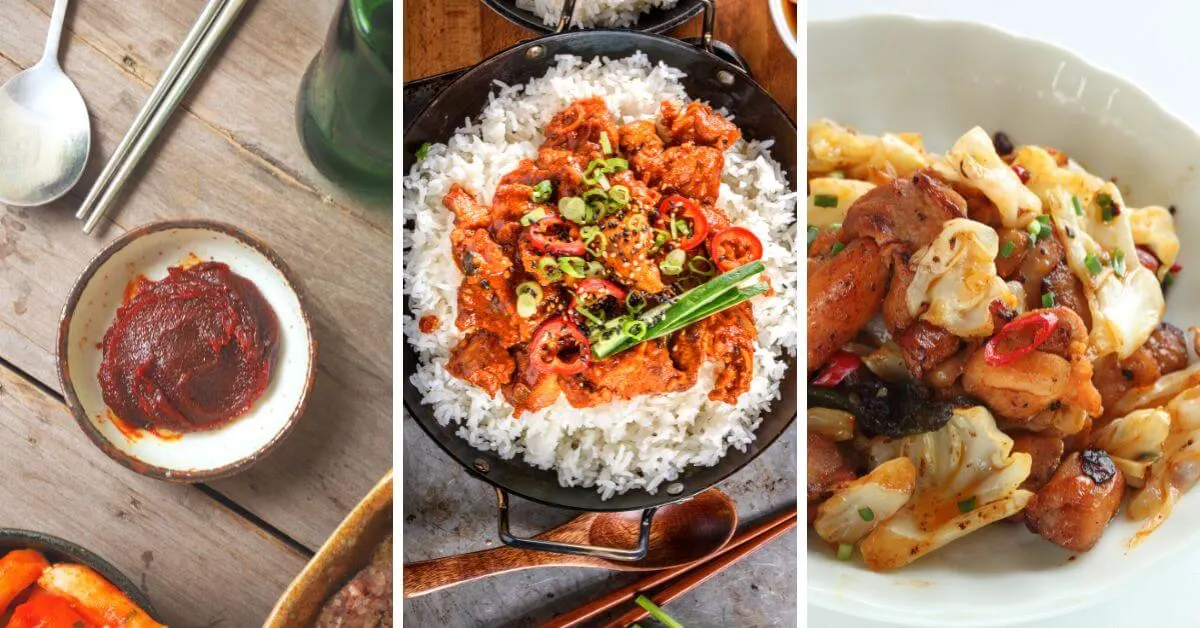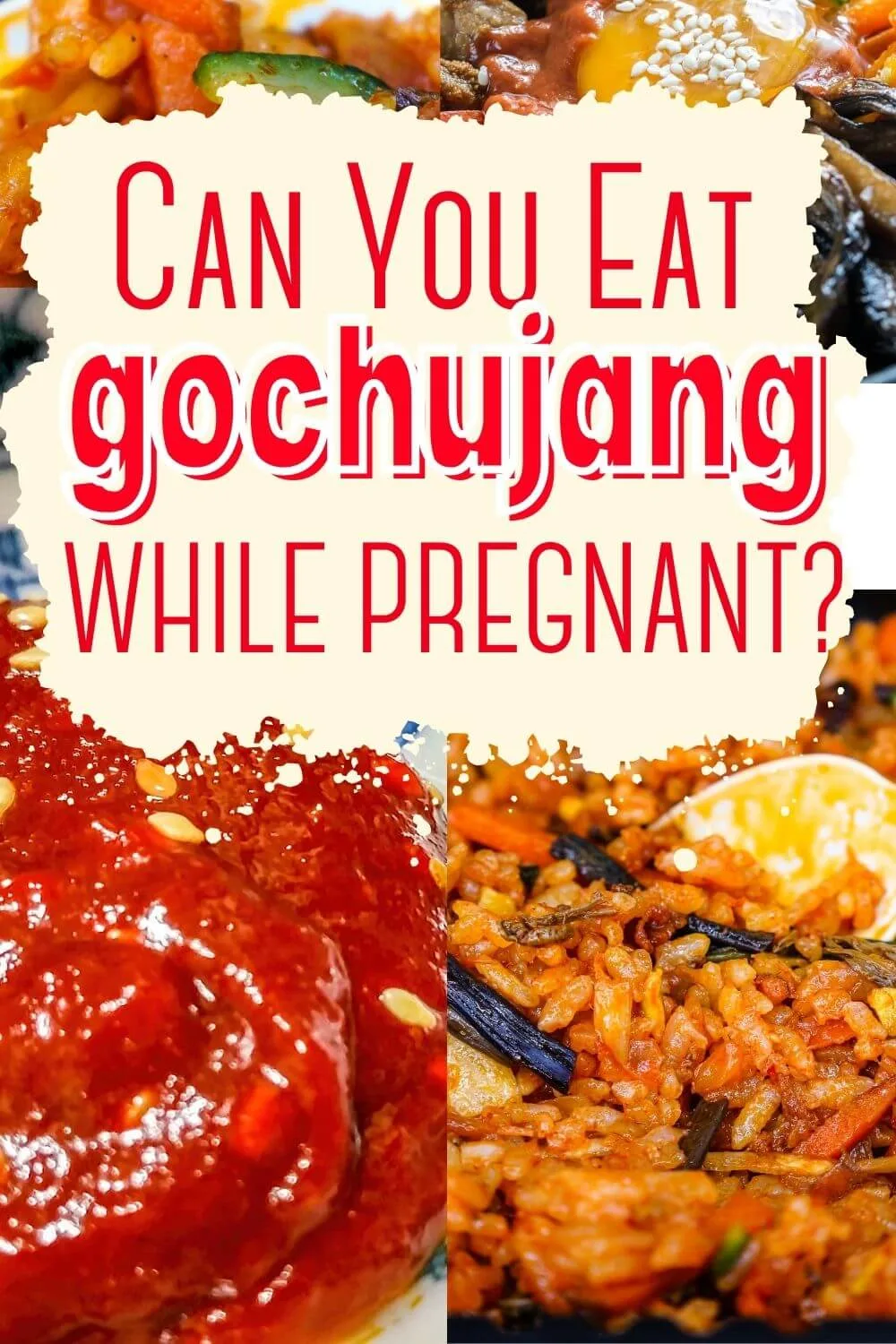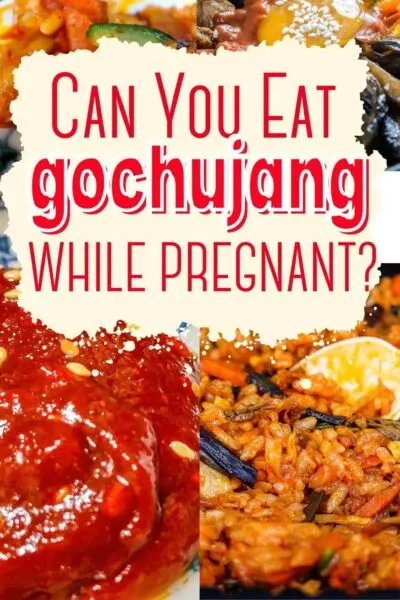Updated May 8, 2023
For pregnant women who love Korean food, the question can I eat gochujang while pregnant is a common one.
Gochujang is a delicious and popular sauce in Korean cuisine, but many pregnant women are unsure if it is safe to consume.

In this article, we will answer that question and also provide some recipes and tips on how to make eating gochujang while pregnant safer for you and your baby!
Gochujang is an ah-mazing fermented Korean chili sauce made from glutinous rice, fermented soybeans, red chili pepper flakes, and salt.
If you have read our post on eating Korean BBQ while pregnant you know that we LOVE Korean BBQ and Korean food in our house.
We also know that craving Korean BBQ during pregnancy is common and who can blame you? It is Delicious!

So let’s jump right and answer the question can you eat Gochujang during pregnancy?
Can I eat gochujang while pregnant?
Yes, you can eat gochujang while pregnant.
However, there are a few things to keep in mind.
First of all, gochujang is made with fermented soybeans.
And as we mentioned in our post on eating kimchi while pregnant, fermented foods can sometimes contain high levels of bacteria which can be harmful to you and your baby.
It is important to make sure that the gochujang you are eating has been properly fermented.
In a Korean BBQ restaurant, you’ll probably be fine eating gochujang, as they do not want customers getting sick so the product they use is likely fresh, from a reputable supplier, and possibly even pasteurized.
Gochujang can go bad, so be sure to check the expiration date if it is store-bought before you eat it.
If you see any mold, if it smells different, or has a sour or vinegar taste, throw it away and do not eat it.
Another thing to keep in mind is that gochujang can be quite spicy.
It is made with red chili pepper flakes after all.
And while we know that many pregnant women love spicy food, eating too much spicy food can cause indigestion, heartburn, and stomach pain.
It may make morning sickness worse too.
If you go out for Korean BBQ at night and eat too much spicy food, you might end up having morning sickness at night.
Yes, that is a real thing!
Make sure to start with a small amount and see how your body reacts.
You can always add more later if you want!
Finally, gochujang is high in salt.
And we all know that too much salt is not good for anyone, but it is especially important to watch your salt intake when you are pregnant.
Try to choose a brand that is low in sodium or make your own at home.
If you are eating it in a restaurant, eat it in moderation and drink plenty of water.
Is Gochujang paste and sauce the same?
Although they are similar, gochujang paste and sauce are not the same.
Gochujang paste is a thick, fermented condiment made from chili peppers, rice, and soybeans.
It is intensely flavorful and typically used as a finishing touch to add heat and depth of flavor to a dish.
In contrast, gochujang sauce is thinner in consistency and is often used as a dipping sauce or marinade.
It generally has a sweeter taste than the paste, due to the addition of sugar or other sweeteners.
While both gochujang paste and sauce can add delicious complexity to your cooking, they should be used according to their unique flavors and textures.
Gochujang Recipes and Safety Tips:
Now that we have answered the question, “Can I eat gochujang while pregnant?”
Let’s talk about some recipes and ways to make it safer to eat while pregnant.
Here are a few of our favorite recipes that use gochujang:
- Gochujang Chicken Stir-fry
- Spicy Gochujang Ramen
- Sweet and Spicy Gochujang Pork
And here are a few tips on how to make eating gochujang while pregnant safer for you and your baby:
- Choose a reputable brand of gochujang that has been properly fermented.
- Start with a small amount and add more to taste.
- Choose a low sodium gochujang or make your own at home.
- Add gochujang to recipes that also include other healthy ingredients like vegetables, lean protein, and whole grains.
- Keep gochujang in the refrigerator to make it last longer. During pregnancy it is best to refrigerate it even though it might not be necessary.
Are fermented foods safe during pregnancy?
It is safe to eat fermented foods during pregnancy, there are three very important criteria that must be met:
- Proper fermentation
- Avoiding raw fish and shellfish
- Pasteurized and/or foods must be heated thoroughly before eating
As long as these 3 criteria are met it is generally safe to eat fermented food while pregnant.
Health benefits of fermented foods include:
- Giving you a boost of good gut bacteria
- Improving digestion
- Boost your immune system
- Lower insulin-resistance
- It May help you lose weight
Can I eat Ssamjang while pregnant?
Ssamjang is a thick, spicy dipping sauce served with Korean BBQ.
It is made with a variety of ingredients, including gochujang (red pepper paste), doenjang (fermented soybean paste), garlic, green onions, and sesame oil.
While it is safe for most people to eat ssamjang during pregnancy, there are a few considerations to keep in mind.
First, ssamjang contains gochujang, which is high in capsaicin.
Gochujang is spicy!
Gochujang paste can cause indigestion and heartburn in some pregnant women.
Additionally, ssamjang is typically quite salty.
If you are prone to swelling or high blood pressure, you should avoid eating too much ssamjang.
Can I eat Doen-jang while pregnant?
A Korean fermented soybean paste, Doen-jang, is a common ingredient in many traditional Korean dishes.
It is made by fermenting soybeans and salt over a period of several months.
Doen-jang is high in protein and vitamins, and it has a deep, earthy flavor.
Although Doen-jang is safe to eat during pregnancy, some experts recommend avoiding it because of its high sodium content.
Too much sodium can cause water retention and raise blood pressure.
If you are pregnant and craving Doen-jang, be sure to eat it in moderation.
Can I eat Bulgogi sauce while pregnant?
Yes you can eat Bulgogi sauce while pregnant!
Bulgogi sauce is made with a variety of healthy ingredients, including Korean soy sauce, pear juice, garlic, ginger, and sesame oil.
These ingredients have all been proven to be safe for pregnant women to consume.
Some Bulgogi recipes use gochujang, so be aware of that.
Is it safe to eat bibimbap during pregnancy?
Bibimbap is a Korean dish that typically contains rice, vegetables, meat, and an egg.
Some people also add gochujang to the dish.
It is generally fine as long as the ingredients are fresh and cooked properly, including the egg..
Is it safe to eat kimbap while pregnant?
Kimbap is a popular Korean dish made of rice, vegetables, and meat rolled in seaweed and served in small slices.
It is similar to sushi, but the rice is not vinegar-flavored, and kimbap is usually not made with raw fish.
When made with cooked ingredients, kimbap is safe to eat during pregnancy.
However, if kimbap is made with raw fish or other uncooked ingredients, it can put you at risk for food poisoning.
If Kimbap is served with raw fish to shellfish it is not safe to eat during pregnancy.
Is it okay to eat samgyupsal while pregnant?
Samgyupsal is a Korean dish of grilled pork belly.
It is common and popular meat, served at Korean BBQ restaurants.
It is typically served with rice and various side dishes.
While the dish is generally considered safe for pregnant women to eat, there are a few things to keep in mind.
It is important to make sure that the pork is cooked thoroughly.
Pregnant women are at an increased risk of developing toxoplasmosis, a parasitic infection that can be found in undercooked pork
In general, samgyupsal is safe for pregnant women to eat as long as it is cooked thoroughly and eaten in moderation.
Is it safe to eat kimchi during pregnancy?
Yes, it is safe to kimchi during pregnancy!
There are a few safety considerations you’ll want to keep in mind when eating kimchi while you are pregnant:
- Make sure to use kimchi that has been fermented for at least a month. This will help to reduce the risk of food poisoning.
- Do not eat kimchi made with raw fish or shrimp since they can increase your risk of contracting a foodborne illness.
Kimchi is made out of fermented cabbage or radishes.
There are some risks to eating kimchi during pregnancy.
Kimchi is fermented and some fermented foods can carry pathogenic bacteria like Listeria, Salmonella, or Botulism.
During pregnancy, we become immune-compromised and more susceptible to food-borne illnesses.
It is safer to choose kimchi that has been pasteurized if you are pregnant.
Common Food-Borne Illnesses
- Listeria
- Salmonella
- E Coli
- Mold
- Campylobacter
- Botulism
These pathogenic bacteria can be found in foods that are not kept at the proper temperature, stored improperly, or that are undercooked.
To reduce your risk of foodborne illness during pregnancy you want to pay close attention to how you prepare, cook and store the foods you eat.
Common symptoms of a severe foodborne illness from eating fermented foods and undercooked meats are:
- Nausea
- Vomiting
- Diarrhea
- Stomach cramps
- Fever
List of foods to not eat when pregnant:
- Foods that are not pasteurized– certain types of cheese like soft cheeses, Brie, Blue Cheese, etc.
- Certain types of fish– shark, swordfish, anything high in mercury
- Raw eggs including egg nog, hollandaise sauce, homemade mayonnaise, and runny eggs.
- Undercooked meats– lunch meats. Deli meats.
- Hot foods that are not “hot”, avoid hot foods that have been sitting out without a warming source. Same for foods that should be eaten cold. If no ice or refrigeration source is keeping the food cold, take a pass.
- Caffeine– soda, chocolate, and energy drinks. (Limit your caffeine to less than 200 mg a day)
- Herbal Teas (There are so many ingredients in herbal teas so it is best to avoid them simply. Green tea is OK.)
List of Foods you should eat during pregnancy:
- Avocado
- Oatmeal
- Pinto Beans
- Black beans
- Arugula
- Bananas
- Dark Green Leafy Vegetables
- Brussel sprouts
- Carrots
- Green Beans
- Eggs
- Lean Meats
- Apples
- Oranges
What should a pregnant woman eat daily?
A pregnant woman needs to consume a variety of nutrients every day to support both her health and the development of her baby.
Protein is essential for building new tissue and can be found in meat, poultry, fish, legumes, and eggs.
Calcium is necessary for strong bones and teeth and is especially important during the third trimester when the baby’s skeleton is rapidly developing.
Pregnant women should aim to get 1000 mg of calcium per day from low-fat dairy products such as milk, yogurt, and cheese.
Iron is also important for the formation of new blood cells, and pregnant women need about 27 mg of iron per day.
Final Thoughts
We hope you found this article helpful and that it answered your question, “Can I eat gochujang while pregnant?”
Remember, you can enjoy gochujang while pregnant as long as you take a few precautions and choose recipes that are also healthy for you and your baby!



